- Home
- Sam Christer
The House Of Smoke
The House Of Smoke Read online
Also by Sam Christer
The Stonehenge Legacy
The Turin Shroud Secret
The Camelot Code
The House of Smoke
SAM CHRISTER
Copyright
First published in Great Britain in 2015 by Sphere
Copyright © Sam Christer 2016
The moral right of the author has been asserted.
All characters and events in this publication, other than those clearly in the public domain, are fictitious and any resemblance to real persons, living or dead, is purely coincidental.
All rights reserved.
No part of this publication may be reproduced, stored in a retrieval system, or transmitted, in any form or by any means, without the prior permission in writing of the publisher, nor be otherwise circulated in any form of binding or cover other than that in which it is published and without a similar condition including this condition being imposed on the subsequent purchaser.
ISBN 978-1-4055-2160-4
Sphere
An imprint of
Little, Brown Book Group
Carmelite House
50 Victoria Embankment
London EC4Y 0DZ
An Hachette UK Company
www.hachette.co.uk
www.littlebrown.co.uk
Contents
Also by Sam Christer
Title Page
Copyright
Dedication
PART ONE
17 Days to Execution
17 Days to Execution
16 Days to Execution
15 Days to Execution
15 Days to Execution
15 Days to Execution
Two Weeks to Execution
13 Days to Execution
PART TWO
Twelve Days to Execution
Eleven Days to Execution
Eleven Days to Execution
Nine Days to Execution
Nine Days to Execution
PART THREE
Eight Days to Execution
Eight Days to Execution
Eight Days to Execution
Eight Days to Execution
One Week to Execution
One Week to Execution
One Week to Executionn
Six Days to Execution
Six Days to Execution
PART FOUR
Six Days to Execution
Five Days to Execution
Five days to Execution
Four Days to Execution
PART FIVE
Three Days to Execution
Two Days to Execution
One Day to Execution
Execution Day
The Day After Execution
Acknowledgments
To Myla
May your unfolding life be more joyous than any story ever written.
PART ONE
I sought my death, and found it in my womb,
I looked for life, and saw it was a shade,
I trod the earth and knew it was my tomb
‘Elegy’, Chidiock Tichborne
London, 30 December 1899
New Year’s Eve. A momentous night.
One I spent alone, in the most inauspicious of dwellings. Certainly not where I had envisaged passing the final hours of the nineteenth century, in the thirty-sixth year of my existence.
On the hard bunk in my fetid prison cell, I closed my eyes to escape the horror of what awaited me. But even in the private darkness of my mind I found no respite. They were always there. The ones I had killed.
The young. The old. The men. The women. Their faces formed and faded like the snowflakes falling beyond my barred window. Death by knife. Death by garrotte. Death by my bare hands. Death by all manner of means.
Midnight bells rang out across London. I pictured people of all ages kissing and making their New Year wishes. Hoping for brighter tomorrows. Resolving to do better and change their ways.
Such fools. The ways of mankind cannot be changed. Lord knows, I have tried. At best, our habits and instincts may be managed – even controlled for a short period – and our lapses into old ways can be hidden or disguised. But ultimately our true self surfaces. We are exposed for what we really are.
And I am a murderer. The taking of life defines me. Indeed, it is the very thing that drives me to escape this dreadful hovel. For peace of mind, I must wreak absolute vengeance on the man who has hurt those closest to me and ruined my life.
You shall be hanged by the neck until dead.
The decree of the Old Bailey judge rang in my ears louder than those midnight bells. Without a flicker of emotion the old bastard set the date and place of my execution. It raised cheers in the public gallery, a smile on the face of the famed detective Sherlock Holmes and a wince of annoyance from his nemesis, James Moriarty.
On the break of dawn on the eighteenth of January in the nineteen hundredth year of our Lord, you shall be taken to the gallows at Newgate Gaol and hanged by the neck until dead.
Seventeen days from now. Four hundred and eight hours. Barely long enough for me to find a way beyond these walls and shed so much blood I swear it will drip from both the sun and moon.
Please forgive the brutality of my language, my ugly outburst. It is not how I wish you to think of me. Not a side of my personality I wish to show the world.
My name is Simeon Lynch and when I was arrested the police recorded my height at five feet and eleven inches. I weighed twelve stones, nine pounds and three ounces and was said to have ‘a muscular build, dark hair and brown eyes’.
Those who knew me as a child would describe me as ‘rough and working class’. In my twenties, circumstances shaped me into a more educated and professional being. My ways and manner of speech became refined and allowed me to present myself as a kindly, courteous and reliable fellow.
But I will tell you who I truly am.
Despite my best efforts, I am a creature of the dark. I am the menacing silhouette that falls across your path. The unexpected hand on your shoulder. The shiver that turns your blood cold.
I am the manservant of Death.
17 Days to Execution
London, 1 January 1900
Night slipped silently away. Dragged with it the tatters of the old year. Left me to view the virgin dawn of the twentieth century from the squalor of my prison cell.
Newgate Gaol is as duplicitous a building as the offenders it harbours. On first appearance, like me, it seems pleasantly respectable. Demurely dressed in grey granites and adorned with sombre sculptures, it stands a stone’s throw from the sacred dome of St Paul’s Cathedral, much as a murderer might in his best suit join the devoted at Sunday Mass.
But inside, all pretence is dropped. It sheds its mask of culture and shows its true face. One that witnessed executioners boiling severed skulls in kettles of camphor. One that still watches over condemned men as they rot in the Devil’s parlours.
Such has been demand of late for the hangman’s services that an old part of the prison, one even more decayed and stinking than the rest, has been opened in my honour.
I paced the musty, cramped space and ran my fingers over dampened walls. The span of the arched ceiling had been curtailed, suggesting the cell had once been larger. There was little else. A pot to piss in. A small, single window, barred and high off the ground. A heavily locked door.
My examination concluded that, as decrepit as it was, the gaol had all the features of a modern fortress. Its architects had intended no easy escape. But I was not deterred. My life had seldom been easy and I had overcome tougher opposition than stacks of bricks and mortar guarded by fat and lazy men.
I sat on the floor among the dirt and cockroaches so I might glimpse clouds shifting in the
grey morning sky. Light and Dark had always been my accomplices in murder, and I hoped would be again. Fewer guards at night meant fewer men to kill. Daylight brought with it fast means of escape – automobiles, trains and ships that could speed you halfway round the world within a week. It was all a far cry from the first time I had spilled blood and had been forced to flee London.
Manchester, autumn 1884
I had not quite reached my twentieth birthday when I crossed that line – the blood-red division between decent souls and those who have taken another’s life. But I was already feral.
The murder I committed had been unplanned. Blood spilt in a split second that stained my soul for eternity. There will be a time to explain it all in detail, to give perspective to my life, but this is not it. For the moment, let us just say that as a result of that terrible act I scurried from the capital, scavenged my way through the Midlands and up to the north-west of England where I stayed out of the grasp of the Metropolitan police.
The journey was a long one. By the time I reached the outskirts of Manchester, England’s trees had yielded their green and were cloaked in copper, gold and pewter. The first winds of autumn blew chill. Winter was coming. Living rough would soon be unbearable.
The big farm that I came upon did not need workers. Nor did the nearby colliery. Nor the factory that made bearings and wheels. Nor the carpenter or blacksmith, or even the undertaker who had a card in his window testifying that he did.
They all had good reason to turn me away. I had seen myself reflected in windows of carriages, houses and shops and I looked uncivilised: tattered, filthy and riddled with lice. If I was to find honest labour then I needed to cut my hair and cleanse both myself and the stinking clothes that made people wince whenever I came near them.
The secluded slopes of a river, fringed with oak and maple, gave me an opportunity to wash. I stripped and lowered myself into the cold water, dipped beneath the bracing surface and rubbed my face and hair. A crop of floating lilies made flannels for my body and I managed to banish some stench from my skin. I climbed out onto the bank and shivered while I rubbed myself dry with grass and leaves.
I was still only half-dressed when a man’s voice turned my head.
‘That’s a right dangerous place to swim.’ He spoke in a thin, nasal northern accent. ‘Looks calm round ’ere but there are undercurrents that will suck you all the way down to the weir. Then you’d be in all manner of trouble.’
The fellow was short and stocky. Five or more years older than me. Bearded, with big brown eyes that belonged more to a bear or dog than a man. He had long, black, curly hair. His hands were clustered with rings and he held the leashes of two slobbering black bulldogs.
‘What’s it to you, whether I’m lost or not, mister?’ I picked up my shirt and put it on.
‘Nowt.’ He allowed the dogs to move nearer to me. ‘Except I’d rather this place wasn’t infested with coppers pulling your body out of the water.’ He walked close enough to allow a dog to sniff at me. ‘My name is Sebastian.’
‘Good for you.’ I pushed his mutt away.
‘People call me Sebastian the Jew.’
‘Good for them.’
‘My name means nothing to you?’
‘I suppose it means you’re Jewish.’ I fastened the rest of my shirt. ‘Is that your Jew gang, mister?’ I nodded to a group of young men forming behind him.
He glanced over his shoulder. ‘Yes and no. They are my acquaintances, but they are not Jewish.’
‘Acquaintances,’ I repeated sarcastically. ‘And do you intend to have your acquaintances beat upon me?’ I rolled up my sleeves and clenched my fists so the knuckles cracked like snapped twigs. ‘Or are they charged with picking up what remains after your dogs are finished?’
‘These?’ He laughed as they pulled their leashes. ‘The worst licking Dee and Dum will give you is with their tongues.’
‘Strange names for dogs.’
‘That’s because they are strange dogs. Brothers they are, like the twins Tweedledee and Tweedledum. Dogs look the same but are very different. One’s lazy and one never rests. Only thing they have in common is they can’t manage a dangerous bark between them, let alone a bite.’ His eyes assessed me in the manner a farmer might choose cattle at a market. ‘That’s an intriguing scar you have on your face.’
‘You must live a very boring life to find a scratch like that in any way interesting.’
‘On its own you might be right. But it’s not on its own. Your skin is browner than a berry, meaning you’ve not been labouring in any local factory but living rough. Your boots are fair knackered, a sure sign you’ve walked your legs short. Those clothes of yours stink worse than my mutts’ arses and your accent is not local. Not local at all. So you see, there’s a handful of reasons why your scar is interesting to me.’
I picked up my footwear and regarded him with suspicion. He was no toff, nor was he a working-class ruffian without brain or charisma. Behind him, more of his gang ominously gathered. There were now eight, maybe ten of them, I could not be sure because they were not still enough to count. ‘You’re right; I’ve been travelling a long while. Looking for work and food, that’s all.’
‘I can give you work. And shelter.’ He knelt and rubbed one of the dogs’ ears. His eyes met mine. ‘A roof, hot food and even clean clothes.’
‘And why would you want to do that?’
‘Because a man on the run from something that put a scar on his face might be useful to me.’ He smiled and added, ‘In return, I’d want hard graft, no cheek or any drunkenness.’
‘I am sober, disciplined and can do an honest day’s toil.’
‘Honest? That’s the last thing I want.’ He looked to his men. ‘He wants honest work, lads.’
There was laughter but no one spoke. They knew their place. Don’t interrupt the boss. Just stand close and wait to be called upon.
I picked out a man second from the left and another, farthest right. These were the hard boys. The ones not crossing their arms and puffing out their chests to look tough. The ones who had nothing to prove.
Sebastian held out his palm. ‘Shake my hand and join us. Or else be off. And if you refuse my hospitality, then make bloody sure you stay well away. This is Scuttler turf and you’ll find we don’t take kindly to strangers around here.’
I grasped his hand. It was soft. Had never done anything more strenuous than hold a dog leash. ‘Terry,’ I said, mentioning the first name that entered my head. ‘Terry Perch. What, may I ask, are Scuttlers?’
‘Scuttlers?’ He smiled easily, ‘Without a doubt, they are the best group of men in all of England.’
He jerked the two sniffing dogs into a slow amble along the river’s edge and I followed, thinking all the time about the men behind us and whether something worse than a beating could befall me.
We halted at the rear of a large mill built of red bricks. There were endless rows of long windows and through the lower ones I saw the scaffolds of loom beams, spidery webs of multi-coloured wool, chimney spindles of wound cotton and armies of busy women.
In the cool shadows of the building, Sebastian introduced me to his men. Most were no older than me and had names I instantly forgot, save those of the two who stayed closest to their leader. Danny was my height and weight but with blond hair and blue-green eyes. He sported a wispy, waxed beard that he seemed to derive great calmness from regularly stroking. The other was a small, fidgety man they called Fingers. I guessed this was because he constantly fluttered a ha’penny back and forth across his knuckles. The coin would always tumble from the smallest to the index finger; he’d roll his hands together and repeat the dextrous manoeuvre across the knuckles of his other hand.
‘We have rooms below the steps,’ said Sebastian. He let the dogs off their leashes and they bounded and skidded down a steep grass bank. He motioned to a black iron staircase. ‘This way’s safer, I think.’
The ‘rooms’ transpired to be nothing more than a l
arge, open and unused part of the lower floor of the mill. Rows of bunks had been erected in a far corner. In the centre stood rough wooden tables and benches where men gathered to eat, play cards and swap stories. The rear wall contained a polished oak door guarded by a muscular young man.
‘That’s my place,’ said Sebastian, following my eyes. ‘You and the boys have the run of all this, but nowhere else.’ He jabbed a thumb over his shoulder. ‘Back there, and what’s kept back there, belong to me. You don’t go inside. Not unless I invite you. That’s another rule.’
‘Lots of rules,’ I said, my gaze rolling over the high cold walls and long floors.
‘Only one,’ he answered. ‘Do as I tell you. If you obey that, then you’ll be fine.’
‘And if I don’t?’
His eyes grew large with excitement. ‘Then, my newfound friend, you’ll be lucky to escape with your life.’
17 Days to Execution
Newgate, 1 January 1900
Fifteen years after that warning from Sebastian the Jew, I reflected on it in the solitude of my cell.
I have known little good luck in my life. And Sebastian certainly brought me none. Indeed, had I known his true character when I met him, I swear I would have walked away from the riverbank and never darkened his turf again.
And had I done so, then my first visitor of this New Year might have been a beautiful maiden rather than a middle-aged gaoler, ruddy skinned with a thick black beard that crept high up a thin face and almost crawled into the pits of his soulless dark eyes. He let the squeaking door bang on its rusted hinges as he strode in, proud of the noise and drama of his entrance.
At the end of my bunk he stopped, kicked my feet and shouted, ‘Stand up, Lynch! Turn around and put your bloody convict hands against that wall!’
I was on my feet instantly. Not out of obedience, but because I sensed a chance to overpower this man, who clearly was a gaoler of authority and might have sufficient keys to afford me the opportunity of escape.

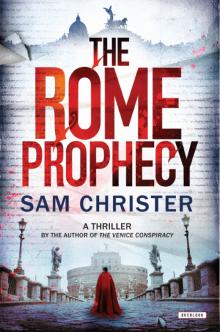 The Rome Prophecy
The Rome Prophecy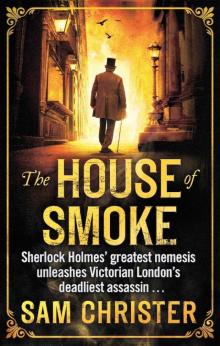 The House Of Smoke
The House Of Smoke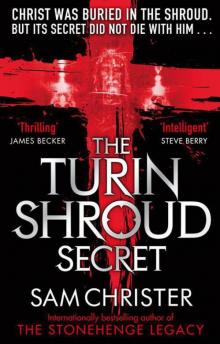 The Turin Shroud Secret
The Turin Shroud Secret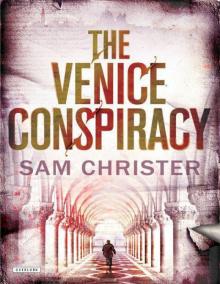 The Venice Conspiracy
The Venice Conspiracy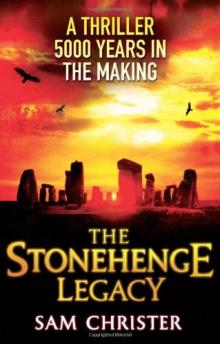 The Stonehenge Legacy
The Stonehenge Legacy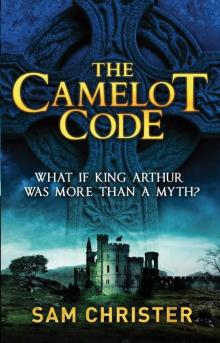 The Camelot Code
The Camelot Code